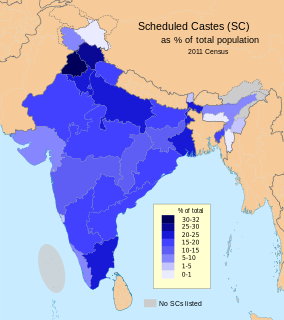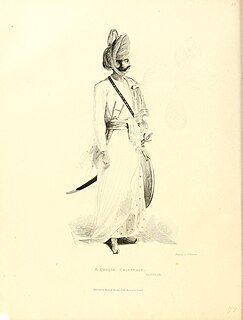Marar may refer to:
- Marar (tribe), a tribe of the United Arab Emirates (UAE)
- Marar (caste), a Hindu Ambalavasi caste in Kerala, India
- Marar, Ramgarh, a town in Jharkhand, India
Marar may refer to:
Jāti is the term traditionally used to describe a cohesive group of people in India, like a tribe, community, clan, sub-clan, or a religious sect. Each Jāti typically has an association with an occupation, geography or tribe. Different religious beliefs or linguistic groupings may also define some Jātis.

The Adivasi are tribes of the Indian subcontinent who are considered indigenous to places within India. The term is a modern Sanskrit word coined in the 1930s by tribal political activists to give an indigenous identity to tribal people by claiming indigenous origin. The term is also used for ethnic minorities, such as Chakmas of Bangladesh, Khas of Nepal, and Vedda of Sri Lanka. However, the government of India does not officially recognise tribes as indigenous people. India ratified the International Labour Organization (ILO) Convention 107 on Indigenous and Tribal Peoples of the United Nations (1957) and refused to sign the ILO Convention 169. Most of these groups are included in the Scheduled Tribe category under constitutional provisions in India.

The Scheduled Castes (SCs) and Scheduled Tribes (STs) are officially designated groups of people and among the most disadvantaged socio-economic groups in India. The terms are recognized in the Constitution of India and the groups are designated in one or other of the categories. For much of the period of British rule in the Indian subcontinent, they were known as the Depressed Classes.
Sopana Sangeetham is a form of Indian classical music that developed in the temples of Kerala in south India in the wake of the increasing popularity of Jayadeva's Gita Govinda or Ashtapadis.
Thakur or Thakar may refer to:
The Sial tribe is a Rajput tribe in the Punjab region of the Indian subcontinent. There is also branch of Jatt originating predominantly from the Jhang District of northern Punjab, Pakistan.
Reservation is a system of affirmative action in India that provides historically disadvantaged groups representation in education, employment, government schemes, health, insurance, banking, foreign higher education, scholarships and politics. Based on provisions in the Indian Constitution, it allows the Union Government and the States and Territories of India to set reserved quotas or seats, which lower the qualifications needed in exams, job openings, university admissions, scholarships, loan approval, promotions etc. for "socially and educationally backward citizens."
Tyagi originally called Taga, is a cultivator caste who claim Brahmin status. The landholding community is confined to Western Uttar Pradesh, Haryana, Delhi and Rajasthan. They are often considered the highest of the agricultural castes. During the British Raj, they changed their name from Taga to Tyagi, and began claiming Brahmin status. In 1931, they were classified as a cultivating middle caste rather than as Brahmins, along with the Jats and Bhumihars. As of a 1990 report by the Backward Classes Commission, Government of Haryana, they were mostly engaged in farming.

The caste system in India is the paradigmatic ethnographic example of caste. It has its origins in ancient India, and was transformed by various ruling elites in medieval, early-modern, and modern India, especially the Mughal Empire and the British Raj. It is today the basis of affirmative action programmes in India. The caste system consists of two different concepts, varna and jati, which may be regarded as different levels of analysis of this system.
General Class/General Category/Open Category is a term used in India to denote castes whose members are on average ahead of other Indians economically and socially. Forward castes account for about 30.8% of the population based on Schedule 10 of available data from the National Sample Survey Organisation 55th (1999–2000) and National Sample Survey Organisation 61st Rounds (2004–05) Round Survey.
Marrar is a Jat tribe of Pakistan and India. According to the book Glossary of tribes Castes of Punjab and NW Province Marrars were Sombansi Jats. The Punjabi tribe of Marrar is not to be confused with the south Indian tribe Marar.
Sipra is a Jat clan in the Punjab region of India and Pakistan. They are mainly concentrated in the western districts of Pakistani Punjab.
Ambalavasi, lit. 'temple-dwelling', is a generic name for a group of castes among Hindus in Kerala, India, who render temple services. Some Ambalavasi castes are patrilineal, while the others are matrilineal. Those that practise matrilineality share many cultural similarities with the Nair caste. Their ritual rank in Hinduism lies between the Brahmin castes and the Nairs.
Sahu. is a surname found in India and Pakistan.
Lodhi may refer to:

The Sapera are a Hindu caste found in North India. They are also known as Barwa Sampheriya in West Bengal, Sapela in Punjab and Sparera in Madhya Pradesh.

The Koli is an Indian caste found in Rajasthan, Himachal Pradesh, Gujarat, Maharashtra, Uttar Pradesh, Haryana, Karnataka, Odisha and Jammu and Kashmir states in India. Koli is a Agriculturist caste of Gujarat but in coastal areas they also work as fisherman along with agriculture. In the beginning of 20th century, the Koli caste was recognised as a Criminal Tribe under Criminal Tribes Act by British Indian government because of their anti-social activities during World War I.
Gaekwad is a surname native to the Indian state of Maharashtra. The surname is found among the Marathas, Kolis and in Scheduled castes. It is also a common surname among Bharadis, Dhor, and Mahar communities of Maharashtra.
Kuzhur Narayana Marar was an Indian musician, considered to be one of the masters of Panchavadyam. He was awarded Padmabhushan by Government of India for his contributions to the propagation of Panchavadyam in 2010. He is the first Panchavadyam exponent to receive Padmabhushan award.
Ilayankudi Maranar, also known Ilaiyangudi Nayanar, Ilaiyankuti Nayanar, Ilayangudi Mara Nayanar, is a Nayanar saint, venerated in the Hindu sect of Shaivism. He is generally counted as the fourth in the list of 63 Nayanars. He is also called Marar, Maran and Mara Nayanar, names he shares with Somasi Mara Nayanar. The two Nayanars are generally differentiated by the prefixes "Ilayankudi" and "Somasi".